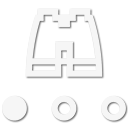Why do we torque things?
Most do it because their told to, not because they understand why. Some people want to be rebels and wont torque anything. Each person will argue that their right and say "I've been doing this for years and I've never had a problem"
Why do we torque things?
The answer has everything to do with fatigue. Do you understand tensile strength or shear? If not you shouldn't touch anything critical. Torqueing is great but everything has a life span. Even if you properly torque, the bolt can eventually fatigue. How long? The answer has too many variables. Torqueing means they will live out their normal life span. Not torqueing means they wont. You never want the bolt to be the weak point.
Reinstalling old bolts can be a double edge sword. Sometimes their fine, sometimes not. Did the guy before you over torque? How do you know? Did the manufacture over kill the bolt size? If it was way over torqued you sure as hell don't want to reuse it. Some bolts even properly torqued are one use only.
In my professional career, I have only seen a few people who should actually be working on vehicles. I've seen things under and over torqued my whole life. I've seen catastrophic failures from both.
Anyone actually know what their oil drain plug torque is? How about the caliper slider bolts? What about the caliper slider bolt that had the bolt replaced with a lesser grade? What's the torque now and can you tell by looking at it? Do most high torque bolts need to be lubed first? Do you know what you should or should not be using for thread lube? Should you be lubing wheel lug studs and what happens when you do or not? If you can honestly answer yes, you are a minority.
Its funny how people tend to react when when confronted with an unknown. In the auto business, the first rule is "a technician is always right". If they over torque or under torque a wheel and it breaks or falls off, its not his fault. Its "the car is a piece of crap" or "the customer must have done something".
Its not his fault because "I've been doing it like this for 20 years and I never have a problem".
Second rule in a shop is, "don't argue with a technician" (see rule 1). What qualifies someone to be a technician? All you need is a bag with a few tools and be slightly mechanically inclined.
I started working for GM in 1979. By 1984, I was a certified GM master tech in a shop with 9 guys. I would struggle with things and when I would question why something failed, the answer was normally "Just replace it, don't worry why". That is how most are trained and I wasn't any different. Then I went to community collage and took automotive. All I can say is WOW. 3 years of night classes to finish and get my AS degree. Later on I found myself wanting more and started taking engineering classes. Now the WOW really came in.
All that time and experience taught me two things, most people get lucky with what they work on and for the first few years and I never should have been allowed to work on cars.
Remember, you need to be certified to cut hair, you don't need to be certified to do brakes. Brakes can kill people, a bad hair cut just pisses people off. I can tech a Racoon to do brakes. That doesn't mean he understands what he's doing or their done safely. Torque or not. Its up to you. If something fails, learn why. Don't blame the vehicle. Odds you did something wrong.
This is not pointed at anyone nor is it finding fault. Don't take offence. I have watched things for years, discussed, trained and helped literally hundreds of people over my lifetime. When I would have a problem, I would go learn about that system or component. Most of the time I found the issue was me not knowing.




